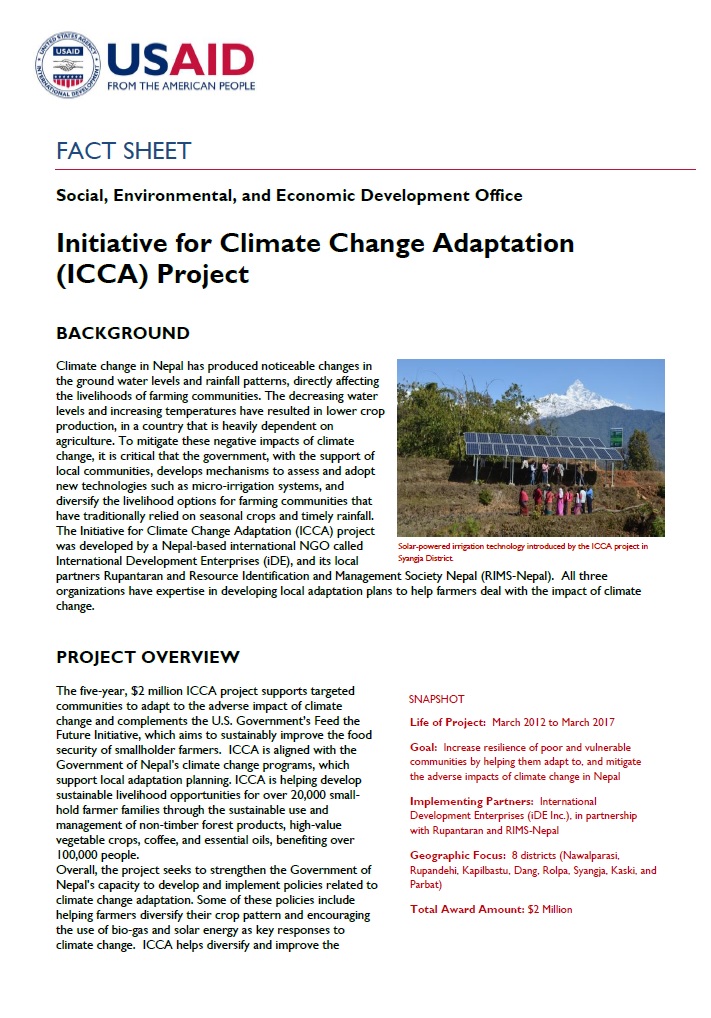Climate change in Nepal has produced noticeable changes in the ground water levels and rainfall patterns, directly affecting the livelihoods of farming communities. The decreasing water levels and increasing temperatures have resulted in lower crop production, in a country that is heavily dependent on agriculture. To mitigate these negative impacts of climate change, it is critical that the government, with the support of local communities, develops mechanisms to assess and adopt new technologies such as micro-irrigation systems, and diversify the livelihood options for farming communities that have traditionally relied on seasonal crops and timely rainfall. The Initiative for Climate Change Adaptation (ICCA) project was developed by a Nepal-based international NGO called International Development Enterprises (iDE), and its local partners Rupantaran and Resource Identification and Management Society Nepal (RIMS-Nepal). All three organizations have expertise in developing local adaptation plans to help farmers deal with the impact of climate change.
PROJECT OVERVIEW
The five-year, $2 million ICCA project supports targeted communities to adapt to the adverse impact of climate change and complements the U.S. Government’s Feed the Future Initiative, which aims to sustainably improve the food security of smallholder farmers. ICCA is aligned with the Government of Nepal's climate change programs, which support local adaptation planning. ICCA is helping develop sustainable livelihood opportunities for over 20,000 smallhold farmer families through the sustainable use and management of non-timber forest products, high-value vegetable crops, coffee, and essential oils, benefiting over 100,000 people.
Overall, the project seeks to strengthen the Government of Nepal's capacity to develop and implement policies related to climate change adaptation. Some of these policies include helping farmers diversify their crop pattern and encouraging the use of bio-gas and solar energy as key responses to climate change. ICCA helps diversify and improve the livelihoods and resilience of poor and vulnerable communities through sustainable income generation and enterprise development. It also identifies and facilitates suitable interventions for enhancing adaptability to climate change and supporting new technologies.
PLANNED ACTIVITIES
-
Capacity Building for Better Management and Adaptation:
Build the capacity of existing local institutions, such as Village Development Committees (VDC),community and farmer groups, and community-managed rural collection centers, to understand climate change and be independent, transparent, and accountable in their responses to it Help communities develop and implement local adaptation plans of action (LAPA) for adapting to the adverse effects of climate change train community members on alternative livelihood options that will allow them to adapt to climate change establish Community Climate Resource Centers (CCRC) with community libraries that offer information on climate change and alternative farming techniques -
Improved Resilience:
Create market linkages between farmers and traders, thereby increasing and diversifying their source of income to make them more resilient to unexpected environmental and economic shocks support sustainable management and harvesting of non-timber forest products, essential oils, and high-value vegetables to support livelihood sustainability and income generation. Engage impoverished communities in economic endeavors such as revolving funds, to support vulnerable families and introduce income generating activities. Encourage public land management, whereby land is managed in a participatory way to develop multiple income generating options -
Adapt to Impacts of Climate Change:
Manage critical watershed periods through water storage, recharging of ground water, prevention of soil erosion, and community-managed Multiple Use Water Systems - Promote improved agricultural practices such as micro-irrigation, integrated pest management, and nursery bed raising
PROJECT RESULTS
Some key ICCA results to date include the following:
- Reached 19,625 households with training and material support, such as seeds and processing machines for new climate-resilient opportunities
- Established 6 essential oil distillation units and strengthened 13 distillation enterprises
- Helped farmers produce 23.5 tons of essential oil and 3,597 tons of vegetables
- Facilitated preparation of 48 LAPAs
- Developed 15 Multiple Use Water Systems, covering 727 households, and increasing users’ annual income by about $265
- Promoted 8 micro-shed recharge ponds with nearly 3,479 microirrigation technologies
- Installed 881 improved cook stoves which use less fuel, are efficient in terms of time and labor, and contribute towards better health and a better environment
- Established and supported 12 Community Climate Resource Centers








Comment
Make a general inquiry or suggest an improvement.